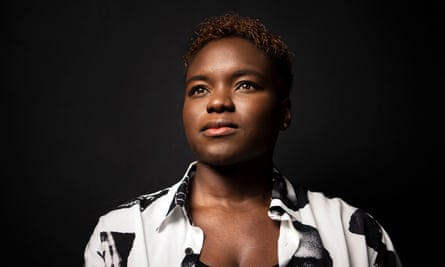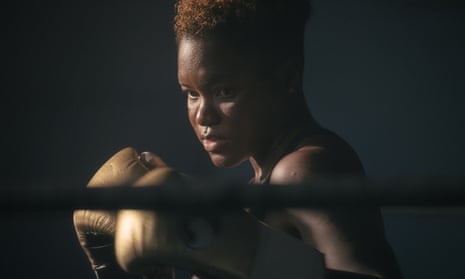There was so much chaos and violence in Nicola Adams’s life as a young girl that, for her, boxing offered a refuge. The ring felt like a safe place where she could discover bravery and resolve deep within herself even when she felt lost and frightened. “I was beaten by my dad and it wasn’t until my mum, my brother and I left, and I started boxing, that things changed,” Adams says all these years later.
She is a double Olympic champion, having won gold at London 2012 and then again four years later in Rio, but it is only now that Adams can reveal that she told her mother that they should murder her father to end their distress. Her mum had other relationships with violent men in later years and Adams says she slept with a hammer under her bed as a way of fighting back.
“Boxing gave me that courage and it made me think that if anything happened again I’d be able to protect myself and my family. Boxing also became my safe space because there was a coach I saw every day. It was like I had a second family and somebody I could talk to. Once you got into the gym you could put everything aside and be yourself.”
Boxing is a dirty and dangerous business but it offers much more light than darkness. “It really does,” Adams says softly. “Boxing gave me a career, an opportunity to protect myself, to get me and my family out of poverty. If it wasn’t for boxing I don’t know where I’d be now.”
A powerful new 90-minute documentary about Adams, directed with sensitivity and compassion by Helena Coan, takes us into the dark heart of her story. The film strips bare the violence Adams says she witnessed and suffered, and also shows the staggering inequality and sexism she overcame in boxing. In giving space to other female fighters, such as the pioneering Jane Couch, Amanda Coulson and Savannah Marshall, Coan highlights their immense battle to become boxers and how Adams’s Olympic success transformed the sport for women in the UK. But her personal story drives the narrative.
“It was almost like having therapy,” Adams says. “I was going through memories I thought I’d forgotten about and they were coming back to life. When I watched the documentary I was like: ‘Whoa, I’ve actually gone through a lot and achieved a lot.’ But at some points it was really painful because I was bringing up old feelings I haven’t talked about since I was really young.”

When she was five years old, “my mum and dad were fighting and I tried to step in and protect my mum. I tried to hit my dad with a little plastic sword, and I was just pushed out of the way.”
Was she frightened for many years? “Yeah, because I couldn’t tell anybody what was really going on. So it was quite a scary time.”
She eventually told her mum that she thought she had found a way out – after watching a soap opera in which a violent husband and father is murdered by his family. “I’d been watching this TV show, I think it was Brookside, and they were going through the same situation. I saw my mum on the steps crying and I went up to her and said: ‘It’s OK, I’ve got a plan. I’ve seen a TV show and I know how to get rid of my dad.’ I just didn’t know where we were going to bury him, because in the programme they had a back garden. We had a garden but it was paved with cement. I said to my mum I didn’t know where we’d get rid of the body and that was when she said: ‘No, I need to change. We need to move.’”
Adams’s father did not accept a written offer from the film-makers to meet with them to discuss her allegations. But they include a note at the end of the documentary which says: “Nicola’s father maintains he was never violent towards Nicola or her mother. He says the allegations are false.” So how did she feel when her dad suddenly popped up again alongside her after she had won gold at London 2012? “It was a strange feeling but I didn’t want to ruin the moment. I wanted everybody to just enjoy me winning a gold medal and making history [as the first British woman to become an Olympic boxing champion]. But, yeah, it was odd. I just didn’t want that moment to be destroyed.”
She called him a few months later. “I wanted to speak to my dad and confront him about what he did to me and my mum. I just wanted an apology so I could move past it and maybe we could build a relationship again. He said I was crazy and none of it ever happened. I was like: ‘What?’ We haven’t spoken since. I was in complete shock. But, even now, if he got in contact and apologised for what he’d done then I’d forgive him.”
When asked to comment for a previous Guardian interview with Adams in 2017, Innocent Adams confirmed he had refused to apologise to his daughter and ex-wife, because he didn’t feel he had anything to apologise for. “The allegations made are completely false,” he said. “I have never been violent towards my ex-wife or Nicola. This is just a defamation of my good character.”
Adams says another man was “quite violent and aggressive as well, and it was at the point where I was sleeping with a hammer under my bed – in case I needed to help my mum. I couldn’t understand why, after all the abuse and everything we’d suffered with my dad, it was happening again. I came back from school one day and this man was taking loads of furniture out of the house. My mum was shouting and I got the hammer from under my bed and said that he had to leave the house. I was going to use it. Luckily he went without me having to use the hammer.”
In the film she talks about throwing a brick through the back window of another man’s car after he had been violent towards her mother. “It was a vicious cycle,” she says.
Adams feels no bitterness towards men despite her upsetting childhood. “I don’t judge everybody from one person’s wrongdoing. If there’s anything I could change it would have been to have therapy when I was much younger. I only had trauma therapy after 2016. It was a real eye-opening experience for me. I still speak to a therapist now and it really helps.”
She needed such positivity in the face of great obstacles in boxing. Her first competitive fight was at the age of 12 and it took four years before her next opponent could be found. That was a sign of how rare it was for girls to be allowed to box in the 1990s – at a time when women were banned from boxing professionally in Britain.
In 2003, aged 20, she won her first international tournament in Hungary. She and Coulson “had to fund all our trips. I was nervous but really excited. I wanted to see how I’d fare because some of the boxers were European champions. I’d had about 10 fights and some of them had had 60 fights. But I boxed four times and won the gold medal. I was like: ‘Wow, this is the first medal we’ve won as women in a multination tournament.’ I couldn’t wait to go to more countries and see what I could do.”

Nothing changed. “It was really frustrating because they’d dangle the carrot: ‘Go away and win medals at tournaments. Do that and you’ll have more funding.’ But about 10 of us girls would get to a major tournament, like the European Championships, on our own. We had to share somebody else’s sweaty kit when they’d just come out of the ring. It was shocking. You’d think we’d at least be able to give us our own kit – especially when the guys had absolutely everything: nutritionists, physios, doctors.”
In 2008, Adams still had to pay her own way to fight in the world championships in China. She couldn’t afford time to acclimatise. “I remember being on the coach on the way to the venue for the first match and I had to drink two cans of energy drink to stay awake,” she says. “I still managed to win a silver medal.”
By the time women’s boxing was finally allowed into the Olympics at London 2012, Adams was driven and relentless. She won gold at her home Games. “It was like: ‘Wow, you’ve made history.’ I just didn’t realise how much my life had changed. People were coming up to me, asking for photographs, and I was going to film premieres and award shows. It was all so different.”
Adams successfully defended her Olympic title in 2016 but her transition into professional boxing was another painful experience. “I was shocked at how far behind professional boxing was for women [when Adams turned pro in 2017]. There had been so many positive changes in amateur boxing which hadn’t happened on the professional side. I wanted to improve women’s boxing in the pros as well.”

She had just six fights, winning her first five and becoming the WBO flyweight champion. Her last bout, against Maria Salinas, ended in a draw at the Royal Albert Hall in September 2019. “I had to lose over a stone in weight in 24 hours before the weigh-in,” she remembers. “My nutritionist and coaches advised me not to box and it was the hardest fight I’ve ever had. In the first round my opponent accidentally caught me with her thumb in my eye and it tore my pupil in two places. I spent the rest of the fight seeing two people in the ring while dealing with the fact I hadn’t eaten properly for a few weeks.”
After doctors advised her that she risked going blind in that damaged eye if she continued to box, Adams retired in November 2019. She is happy that women’s boxing, in both the amateurs and the pros, “is a totally different place now. It’s really good to see. But women’s boxing should be like MMA in the UFC where women get the exact same pay, treatment and publicity as the men. I want boxing to be in that same space.”
Where is her “safe space” now she longer turns to the ring? “It is with my family, with Ella [her partner] and with my dog. I have my therapist and my team around me. I just love the space that I’m in. I have my acting to focus on. I’m getting training on that and I always like to learn something new so I can improve. There are endless possibilities for me to explore now. In boxing you have to be very poker-faced and unemotional whereas, with acting, I’m learning how to express my emotions, from pain to happiness.”
Adams pauses when I ask what advice she would give to her younger self when life was full of trauma and pain? “I’d just say: ‘Stick at what you’re doing. You’re doing really well. I know times are really hard right now but you will get through it and you’re going to become a legend, a two-time Olympic champion, world champion as a professional boxer. Just don’t let things get you too down.’”
Lioness – The Nicola Adams Story launches on Prime Video on 12 November
